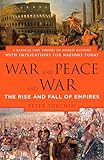War and peace and war: the rise and fall of empires / Peter Turchin
Por: Turchin, Peter [autor].
Tipo de material: Libro
impreso(a)
Editor: New York, New York, United States: Penguin Putnam Inc, 2006Descripción: 405 página ; 23 centímetros.ISBN: 0452288193; 9780452288195.Tema(s): Historia universal
Libro
impreso(a)
Editor: New York, New York, United States: Penguin Putnam Inc, 2006Descripción: 405 página ; 23 centímetros.ISBN: 0452288193; 9780452288195.Tema(s): Historia universal| Tipo de ítem | Biblioteca actual | Colección | Signatura | Estado | Fecha de vencimiento | Código de barras |
|---|---|---|---|---|---|---|
| Libros |
Biblioteca Campeche
Texto en la configuración de la biblioteca Campeche |
Acervo General | 909 T8 | Disponible | ECO040007076 |
Introduction.. Part I. Imperiogenesis.. Chapter 1. A Band of Adventurers Defeats a Kingdom.. Chapter 2. Life on the Edge.. Chapter 3. Slaughter in the Forest.. Chapter 4. Asabiya in the Desert.. Chapter 5. The Myth of Self-Interest.. Chapter 6. Born to Be Wolves.. Chapter 7. A Medieval Black Hole.. Part II. Imperiopathosis.. Chapter 8. The Other Side of the Wheel of Fortune.. Chapter 9. A New Idea of Renaissance.. Chapter 10. The Matthew Principle.. Chapter 11. Wheels Within Wheels.. Part III. Cliodynamics.. Chapter 12. War and Peace and Particles.. Chapter 13. The Bowling Alley in History.. Chapter 14. The End of Empire?.. Notes.. Acknowledgments.. Index
In War and Peace and War, Peter Turchin uses his expertise in evolutionary biology to offer a bold new theory about the course of world history. Turchin argues that the key to the formation of an empire is a society's capacity for collective action. He demonstrates that high levels of cooperation are found where people have to band together to fight off a common enemy, and that this kind of cooperation led to the formation of the Roman and Russian empires, and the United States. But as empires grow, the rich get richer and the poor get poorer, conflict replaces cooperation, and dissolution inevitably follows. Eloquently argued and rich with historical examples, War and Peace and War offers a bold new theory about the course of world history with implications for nations today. eng
